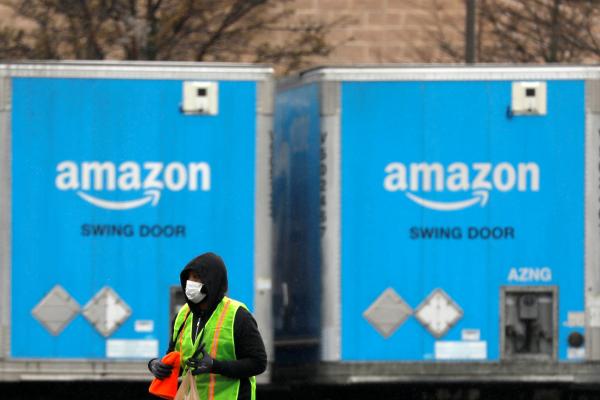An adequate response to the coronavirus pandemic currently spiking within the U.S. requires a strong and coordinated effort from a federal government that prioritizes the common good. Unfortunately, some of the people running our federal government right now barely believe that it should exist.
On Sunday, Sen. Ted Cruz (R-Texas) tweeted while self-quarantined: “If you can buy a gift certicate [sic] from a local small business—a restaurant or a toy store or a hair salon—now is a good time to do so. Small acts of kindness, of love in our communities, repeated a million times over, that’s how we will make it through together.”
He also replied, “exactly right,” to another tweet that read: “The Church is a body not a building; the Church is people, not a place. The building may be closed, but the Church is not closed. On this day of prayer let us remember that our hope comes from the Lord, not from DC, and join together as a nation in prayer.”
Individual and communal acts of charity in these times are certainly necessary and good. But I’m not so sure that imagining our society’s economic and health care needs as one massive GoFundMe campaign is how we will get through this.
One can applaud the way in which celebrities like Zion Williamson are pledging to pay stadium workers while wondering why workers are in such a precarious position to begin with.
Churches and places of worship have a role to play during a pandemic, whether it’s through food pantries or virtual community, without being used as cover for a failure in political leadership.
In one sense, Trump’s response to the pandemic and Cruz’s words can be seen as the logical conclusion of Ronald Regan’s project, captured in the slogan from his 1981 inaugural address: "Government is not the solution to our problem, government is the problem."
As Sarah Jones pointed out, Trump’s answer to this public health emergency has been to empower and enrich the private sector. From whence cometh our help? Our help cometh from Google, Target, WalMart, and Walgreens. Granted, there’s nothing wrong with the private sector helping. But Trump has repeatedly exaggerated what companies like Google are doing, while refusing to take responsibility and minimizing the federal government’s important role. In yesterday’s press briefing, the president appeared, once again, to be punting to state governors and local governments to tackle pressing needs.
I’m reminded of the conversation I recently had with journalist Katherine Stewart about her book The Power Worshippers: Inside the Dangerous Rise of Religious Nationalism . The Trump administration’s general approach to the coronavirus also fits within a larger and older Christian-libertarian alliance.
As Kevin Kruse highlighted in One Nation Under God: How Corporate America Invented Christian America , one of the most effective evangelists against the social safety nets of the New Deal was Billy Graham. Nicknamed “the Big Business evangelist,” Graham criticized Democrats for spending money on the welfare state at home and the Marshall Plan abroad. In one 1951 talk, Graham said: “Their greatest need is not more money, food, or even medicine; it is Christ. Give them the Gospel of love and grace first and they will clean themselves up, educate themselves, and better their economic condition.”
What we've seen in Trump’s first term is part of an old Christian-libertarian playbook. Denounce big government as godless, authoritarian, and inefficient. Defund public services and enrich the private sector as it steps in to fill in the gap. Leverage big government to favor Christians and the wealthy. Within such a playbook, the go-to move in an emergency is disaster capitalism.
Unlike some conservative critics of Trump, I don’t think Trump’s issues are reducible to his personal morality, coarse speech, and utter incompetence — even if these are damning in themselves. Trump has allies and enablers who see him as a vehicle for their political ideology.
The coronavirus pandemic is revealing a devasting feedback loop in which inequality exacerbates the spread of the virus, and the spread of the virus exacerbates inequality. Those experiencing homelessness, detention, or imprisonment are particularly vulnerable. With virtually everything shutting down indefinitely and a looming economic recession, a majority of Americans are now forced to survive in a country that doesn’t guarantee paid sick leave, childcare, a living wage, or health care as a human right.
Yet, amid the worsening pandemic, the Trump administration — whose biggest legislative accomplishment thus far has been to pass tax cuts benefitting the rich — has been moving forward with tougher work requirements for food assistance and has not offered states the opportunity to extend Medicaid on an emergency basis.
With Congress negotiating bailout packages, and major corporations pleading with Trump for government assistance, it’s evident the problem isn’t big government vs. small government. The problem isn’t the “freedom” of unregulated markets vs. the “totalitarianism” of social democracy. The federal government is big, and it intervenes. The question is, for whom?
It’s one thing to acknowledge that a government is neither perfect nor divine. It’s quite another thing to abandon a government’s responsibility to put people before profits and to serve the common good.
St. Augustine, who wrote The City of God during the Roman Empire’s decline, said: “Justice being taken away, then, what are kingdoms but great robberies?”
Got something to say about what you're reading? We value your feedback!





